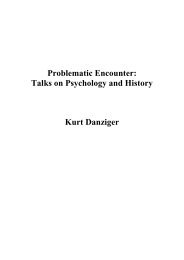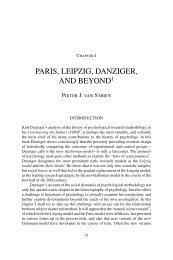The positivist repudiation of Wundt - Kurt Danziger
The positivist repudiation of Wundt - Kurt Danziger
The positivist repudiation of Wundt - Kurt Danziger
You also want an ePaper? Increase the reach of your titles
YUMPU automatically turns print PDFs into web optimized ePapers that Google loves.
220 KURT DANZIGER<br />
role <strong>of</strong> overwhelming importance in Machian psychology. Well over half <strong>of</strong> the substance<br />
<strong>of</strong> Kulpe’s 1893 text, as well as <strong>of</strong> Ebbinghaus’s 1897 text, is devoted to the topic <strong>of</strong> sen-<br />
sation, although they were intended as general introductions to psychology. <strong>The</strong> contrast<br />
with <strong>Wundt</strong>’s countertext, the Grundriss <strong>of</strong> 1896, is quite striking. It is only a partial ex-<br />
planation <strong>of</strong> this curious imbalance to suggest that Kulpe and Ebbinghaus were solely in-<br />
terested in treating topics for which experimental evidence was available; the discussion<br />
<strong>of</strong> more complex processes in the remainder <strong>of</strong> their texts shows that they regarded sen-<br />
sations as the basis for practically the whole <strong>of</strong> psychology.<br />
<strong>The</strong>ir disagreements with <strong>Wundt</strong> about the nature <strong>of</strong> feeling are a reflection <strong>of</strong> this<br />
outlook. <strong>Wundt</strong> had produced his dimensional analysis as a way <strong>of</strong> coping with the<br />
qualitative complexity <strong>of</strong> feeling that defied analysis into elements. <strong>The</strong> Machian psy-<br />
chologists, on the contrary, reduced feeling as such to pleasure and pain and attempted to<br />
account for other aspects <strong>of</strong> feeling in terms <strong>of</strong> organic sensation^.^^ <strong>The</strong>re can be little<br />
doubt that they were prompted to do this by their distrust <strong>of</strong> central guiding processes,<br />
which they regarded as quasi-metaphysical, and by their desire to explain as much as<br />
possible by means <strong>of</strong> simple and concrete processes with an identifiable material cor-<br />
relate. Thus, “organic sensations” became a kind <strong>of</strong> Machian substitute for those com-<br />
plex central processes which seemed to have no place in a strictly <strong>positivist</strong> psychology.<br />
Titchener sums it up: “Now I personally believe that the organic sensations play an im-<br />
portant part, not only in feeling and emotion, but in many other departments <strong>of</strong> the men-<br />
tal life: in the formation <strong>of</strong> sensory judgments, in the mechanism <strong>of</strong> memory and recogni-<br />
tion, in motives to action, in the primary perception <strong>of</strong> the self.” 84 In historical perspec-<br />
tive, the most important aspect <strong>of</strong> the sensationist doctrine was the shift in the basis <strong>of</strong><br />
psychological analysis and explanation from complex central processes to elementary<br />
processes with a concrete material source at the periphery <strong>of</strong> the nervous system. This<br />
turned out to be one <strong>of</strong> a number <strong>of</strong> theoretical preferences which Watsonian<br />
behaviorism was able to share with Machian introspectionism.<br />
Elementism<br />
<strong>The</strong> sensationism <strong>of</strong> the early Machian psychologists was doubly motivated by their<br />
philosophy <strong>of</strong> science. Not only did sensations seem to be free <strong>of</strong> the suspicion <strong>of</strong><br />
“metaphysics,” they also provided the most obvious means for psychology to comply<br />
with Mach’s famous principle <strong>of</strong> economy in scientific theorizing. As scientific concepts<br />
could not refer to any real world behind the world <strong>of</strong> appearances, their sole purpose was<br />
to summarize observed relationships in the most parsimonious manner possible. This<br />
meant avoiding the multiplication <strong>of</strong> concepts to describe different sets <strong>of</strong> data - the<br />
same concepts should be used to describe the largest possible range <strong>of</strong> phenomena. In its<br />
application to psychology, this principle manifests itself in one or other form <strong>of</strong> reduc-<br />
tionism. <strong>The</strong> overriding importance which the principle <strong>of</strong> economy attained in the<br />
Machian version <strong>of</strong> the <strong>positivist</strong> philosophy <strong>of</strong> science dictated that the same kind <strong>of</strong><br />
elementary concept should be used to account for all levels <strong>of</strong> phenomena, the complex<br />
as well as the simple. In Titchener’s words, “If modern psychology is to be termed sen-<br />
sationalistic, that is not because it is wedded to sensation. It must mean simply that psy-<br />
chology prefers to work with as few tools as possible, and that sensation alone, or sensa-<br />
tion and affection together, seem to give it all that it requires for the work <strong>of</strong> analysis.” 65<br />
<strong>Wundt</strong>’s principles <strong>of</strong> psychic causality, among other things, <strong>of</strong>fended the Machian prin-<br />
ciple <strong>of</strong> economy. But then <strong>Wundt</strong> argued directly against Mach that one should not<br />
elevate this principle to the point where it implied the metaphysical assertion that nature





